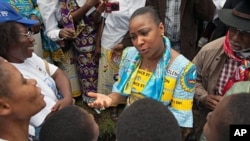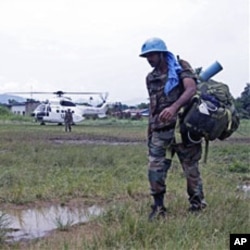Despite international attention to the problem of mass rape in the Democratic Republic of Congo, U.N. officials, analysts and activists say sexual violence and the use of rape as a weapon of war remain prevalent in the eastern part of the country.
Hundreds of women recently marched in the eastern city of Bukavu to chant against rape.
One of the protesters was Congo's first lady, Marie Olive Kabila. Others had just been released from nearby hospitals where they had been treated for sexual violence.
Many similar marches have been held in recent years, thousands of U.N. peacekeepers are in eastern Congo, dozens of local and foreign non-governmental organizations try to tackle the problem, but mass rapes continue.
The head of the U.N. peacekeeping mission in the Congo, Roger Meece, recently described the scale of the problem as enormous.
"The best data available for example suggests that over 15,000 rapes were committed last year in eastern DRC," he said.
In recent years, eastern Congo has been overrun by several-dozen armed groups, renegade soldiers, militias and foreign-backed rebels competing to control mineral-rich areas.
Meece said the peacekeeping mission known as MONUSCO has limits to what it can prevent.
"In this vast area larger than the size of Afghanistan, it is not possible for MONUSCO to ensure full protection for all civilians,said Meece. "To approach this goal would require vastly greater force levels and resources."
Some studies indicate that up to 40 percent of women in eastern Congo have been raped at some point in their life.
U.N Special Representative on Sexual Violence Margot Wallstrom recently returned from a trip to Walikale in North Kivu province, where hundreds of women were mass raped by Rwandan rebels and Mai Mai militia in July and August. Further reports indicated that Congolese soldiers deployed to reassert their control in the area also committed rapes.
Wallstrom was aghast at some of the testimony she heard, pounding the table in disbelief at a recent briefing.
"Grandmothers who say that those young people who come here could be my grandchildren. 'And you come to rape me, one of the mothers of Congo?" Asked Wallstrom. "What is going on here? And how can you help us to stop this?"
Kate Cronin-Furman is a human-rights lawyer and a prominent blogger on issues surrounding atrocities.
"Awareness is not enough to solve problems. The issue right now is not that people do not know this is happening," she said. "I mean it has been all over the international media for years at this point. The issue is that when a state fails and there is no security apparatus in place it is incredibly difficult to deal with mass crime."
American independent journalist Joe Bavier, who is working on an oral history about Congo's conflict, says he believes the situation of sexual violence will continue as long as there is conflict in eastern Congo.
"It is something that has become a weapon of war, a tactic of war. It is used as a means of terror by the groups vying for control of areas of North Kivu and South Kivu," Bavier said. "This is nothing new. You rarely see confrontations between the various sides in this conflict. "
Instead, he says, with rapidly shifting front lines, armed groups accuse civilians of being collaborators with whichever group was previously passing through and then use rape as a weapon of terror and humiliation.
Former U.N investigator Jason Stearns is working on his own book about the Congo, tentatively titled "Dancing in the Glory of Monsters". He says rapes are also used as a means of indoctrination within armed groups.
"Sexual violence or rape is used in a gang-rape setting to make sure that new recruits actually feel like they are part of the group," he said.
Stearns says instances of civilian on civilian rape are also high.
"The torn social fabric, a culture of chauvinism and sexism is becoming more predominant. Unfortunately you see even among civilians in the Congo that sexual violence is becoming more prominent and that is also very disturbing," Stearns said.
A leading Congolese activist against sexual violence, Justine Masika Bihamba, recently concluded a trip in the United States to garner outside support.
She said what is needed above all to reduce sexual violence is the search for peace and an end to the conflict.
Another long-term solution, she said, may be to set up a hybrid Congolese-international court to deal with the issue of impunity.
In the meantime, she is calling for more local tribunals in eastern Congo, as well as training, reform and better pay for police, judges and military so they can become a part of the solution, rather than a part of the problem, she says, in Congo's lasting and debilitating rape epidemic.





